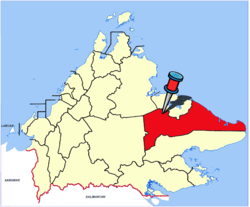Kinabatangan
| Kinabatangan | ||
|---|---|---|
| District and Town | ||
|
Kinabatangan district council. | ||
| ||
 | ||
 Kinabatangan | ||
| Coordinates: 5°25′0″N 117°35′0″E / 5.41667°N 117.58333°E | ||
| Country |
| |
| State |
| |
| Division | Sandakan | |
| Government | ||
| • District Officer | Arisin bin Aripin | |
| Population (2010) | ||
| • Total | 146,987 | |
| Website | www.sabah.gov.my/md.kinabatangan www.sabah.gov.my/pd.kbtg | |
Kinabatangan is a district and town located in Sandakan Division, in the east of Sabah, Malaysia on the island of Borneo. The district office is located in Kinabatangan town. Its population was estimated to be around 146,987 in 2010.[1] Kinabatangan is mostly populated with members of the 'Sungai' tribe, one of the indigenous groups of Sabah. District administration is currently headed by District Officer Mr. Arisin Aripin (2011–present). Economic activities are centred on oil palm plantations, forestry. and wood-based industries.
The nearby Kinabatangan River is an area along which small fragments of lowland riverine rainforest remain: the Kinabatangan Wildlife Sanctuary. The area is wet and humid and the swampy lowlands are home to particularly high densities of Borneo's more emblematic birds and mammals, such as hornbills, Borneo elephants, and the endemic proboscis monkey. Scattered in the area are limestone outcrops, many with caves that harbour large nesting colonies of echolocating swiftlets, as well as endemic limestone-inhabiting flora and fauna, such as Diplommatinidae snails.[2] The largest and best known of these limestone hills is Gomantong.
Kinabatangan also is the large of area under Ramsar site (estuary) with 78 000 hec both combined rivers that as Kinabatangan and Segama was gazetted in 2008 as 'KInabatangan-Segama Wetlands Ramsar site'. The recognition is significant, as the wetlands comprise rarely found coastal mangrove swamps and peat jungles.
References
- ↑ "Total population by ethnic group, administrative district and state, Malaysia, 2010" (PDF). Department of Statistics, Malaysia. 2010. Retrieved 3 May 2014.
- ↑ Schilthuizen, M., A. van Til, M. Salverda, T.-S. Liew, S.S. James, B. Elahan & J.J. Vermeulen, 2006. Microgeographic divergence in a snail associated with behavioural differences in its predator. Evolution, 60: 1851-1858.
External links
- (Malay) Kinabatangan District Council
- (Malay) Kinabatangan District Office
Coordinates: 5°09′28″N 117°04′57″E / 5.157796°N 117.08245°E

